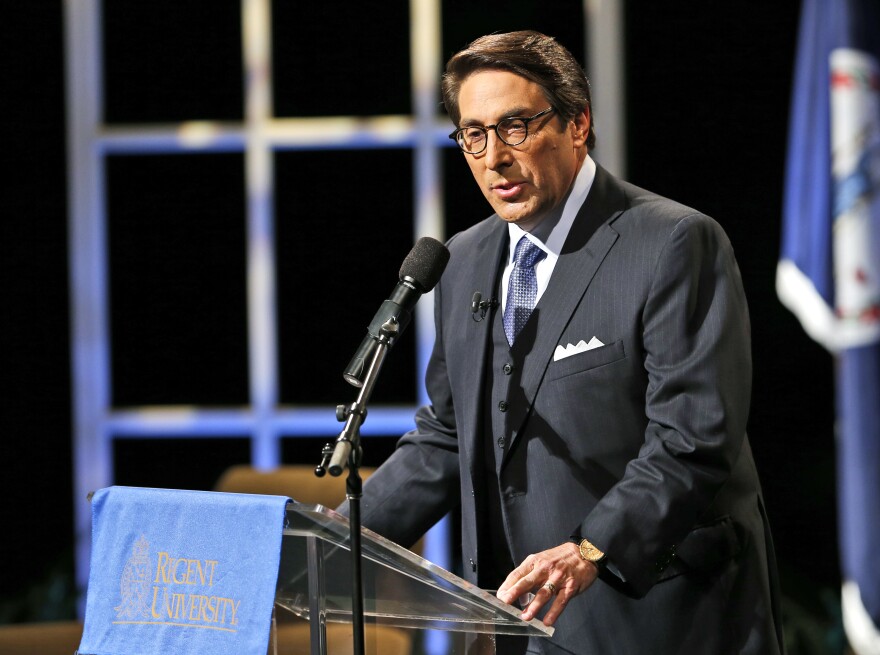Defending President Trump on television is giving longtime conservative lawyer Jay Sekulow new prominence these days, but it's also reviving questions about a pair of charities he is involved with.
Sekulow, 61, who appeared on all five Sunday morning news shows over the weekend to address questions about Trump's ties to Russia, is a fixture in the Christian conservative movement, serving as chief counsel of the American Center for Law and Justice.
He and his family also make up the entire board of a second charity linked to the ACLJ called Christian Advocates Serving Evangelism, or CASE.
Watchdog groups have long raised questions about the staffing, fundraising and organizational structures of the two groups.
"They're a textbook case of having severely flawed governance and transparency," says Daniel Borochoff, president and founder of CharityWatch.
"Our current reading for them is a one-star, which — our ratings are out of four stars. It's definitely on the lower side of our rating system," says Katie Rusnock, advisory system manager at Charity Navigator.
The structure of CASE and the ACLJ is complicated. CASE raises money on behalf of conservative causes, but does so under the name of the ACLJ. Sekulow's daily radio show, Jay Sekulow Live, features regular appeals for donations from its Christian conservative audience.
The Guardian recently quoted from a script telemarketers use when asking donors for money:
"A script contained in the contract instructed the telemarketers to tell people that their money was needed for Case's 'massive campaign to repeal and replace Obamacare'.
" 'Many people are helping with smaller amounts,' fundraisers were told to say. 'Can Jay count on you for a smaller, but just as important gift?' People should be urged a third time to donate if they continued to resist, the script said."
Largely through small donations, the ACLJ took in nearly $230 million in charitable donations from 2011 to 2015, according to a recent analysis of tax filings by the Washington Post.
The money has enabled the ACLJ to become a kind of right-wing alternative to the American Civil Liberties Union, waging legal battles against gay rights, abortion and laws considered anti-religious. Sekulow himself has argued more than once before the Supreme Court.
According to its federal tax filings, "The center is committed to ensuring the ongoing viability of freedom and liberty in the U.S. and around the world by focusing on U.S. constitutional, European Union and human rights law[;] the center and its affiliated organizations are dedicated to the concept that freedom and liberty are universal, God-given and inalienable rights that must be protected."
But charity watchdogs note that a large amount of the money raised by the two groups goes to Sekulow, his family members and businesses they run.
According to the Post's analysis, "$5.5 million was paid directly to Sekulow and five family members in salary or other compensation, tax records covering those years show. Another $7.5 million went to businesses owned by Sekulow and his sister-in-law for producing and consulting on TV, movie and radio shows."
Sekulow himself receives no salary as ACLJ chief counsel, but about 94 percent of its funds for outside legal work went to a small law firm he co-owns.
"What needs to be asked of CASE and ACLJ is: Are there no other law firms or lawyers in the United States that could work for this charity? Surely there's somebody else that would be qualified," Borochoff says.
Borochoff says the larger problem is the lack of independent oversight of these groups, particularly when it comes to the involvement of family members. For example, CASE's board is made up of Sekulow's relatives.
"It's very rare to see a group that has this many related-party transactions where you've got a board that's all family members," Borochoff says.
The ACLJ has two independent directors on its three-member board, including televangelist Pat Robertson. However, Borochoff says the group isn't really independent either, since its funding is essentially controlled by CASE.
Charity Navigator also has concerns about the amount of money going to ACLJ's programs, which is declining when compared with spending.
The ACLJ did not respond to a request for comment, but spokesman Gene Kapp recently told the Guardian its compensation practices have been deemed reasonable by outside experts.
"The financial arrangements between the ACLJ, Case and all related entities are regularly reviewed by outside independent compensation experts and have been determined to be reasonable. In addition, each entity has annual independent outside audits performed by certified public accounting firms.
"Further, the IRS has previously conducted audits of the ACLJ and Case and found them to be in full compliance of all applicable tax laws."
Charity watchdogs say outside auditors look at the finances of nonprofits, not other issues such as governing structure and hiring of relatives.
The two charities have never been accused of wrongdoing by U.S. officials.
The organizations' financial structure has attracted the attention of two Democratic attorneys general, though, New York's Eric Schneiderman and North Carolina's Josh Stein.
"The reports I've read are troubling. My office is looking into this matter," Stein said in a statement.
Copyright 2021 NPR. To see more, visit https://www.npr.org.




